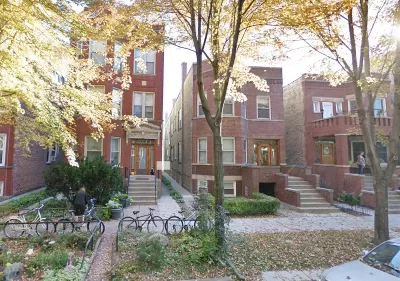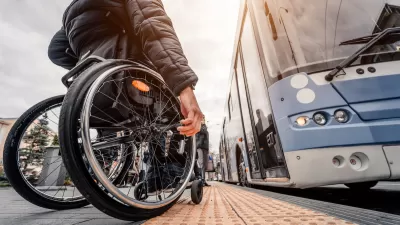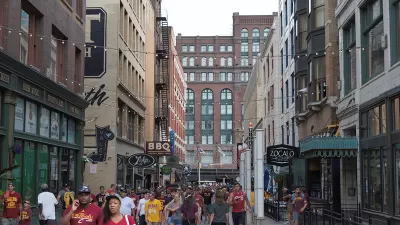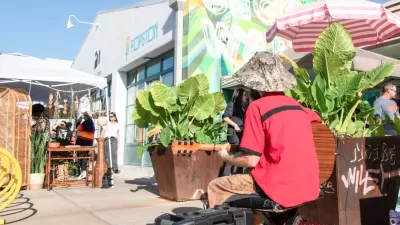A study of Chicago neighborhoods showed that access to urban amenities does not necessarily correlate with improved economic outcomes.

The '15-minute city' has become a popular buzzword for mayors around the world, but new research shows that close proximity to urban amenities does not necessarily correlate with lower poverty rates or more equitable outcomes.
As John Greenfield writes, Doug Bright used a series of maps created by Jeremy Glover that "looked at access to eight different types of destinations: grocery stores, parks, libraries, elementary schools, high schools, hospitals or urgent care centers, pharmacies, and ‘L’ stations" in Chicago to assess the relationship between 15-minute neighborhoods and equity.
[W]hite residents, who are more likely than other groups to live in dense neighborhoods, such as downtown and in the North Lakefront neighborhoods, are overrepresented in the areas that have high levels of access to essential resources. But counterintuitively, [Bright] also determined that 'The highest poverty rate (22%, compared to an 18% city average) is also found at the highest level of access.'
In conclusion, "[a]ny strategies for planning imported (especially in a top-down manner) from other cities, countries, or continents should be regarded with healthy skepticism, as one-size-fits-all approaches are bound to ignore important nuances and autonomy of a place."
The full paper is available here.
FULL STORY: Study: 15-minute walk/bike access to key resources is not enough to guarantee prosperity

Alabama: Trump Terminates Settlements for Black Communities Harmed By Raw Sewage
Trump deemed the landmark civil rights agreement “illegal DEI and environmental justice policy.”

Study: Maui’s Plan to Convert Vacation Rentals to Long-Term Housing Could Cause Nearly $1 Billion Economic Loss
The plan would reduce visitor accommodation by 25% resulting in 1,900 jobs lost.

Planetizen Federal Action Tracker
A weekly monitor of how Trump’s orders and actions are impacting planners and planning in America.

Waymo Gets Permission to Map SF’s Market Street
If allowed to operate on the traffic-restricted street, Waymo’s autonomous taxis would have a leg up over ride-hailing competitors — and counter the city’s efforts to grow bike and pedestrian on the thoroughfare.

Parklet Symposium Highlights the Success of Shared Spaces
Parklets got a boost during the Covid-19 pandemic, when the concept was translated to outdoor dining programs that offered restaurants a lifeline during the shutdown.

Federal Homelessness Agency Places Entire Staff on Leave
The U.S. Interagency Council on Homelessness is the only federal agency dedicated to preventing and ending homelessness.
Urban Design for Planners 1: Software Tools
This six-course series explores essential urban design concepts using open source software and equips planners with the tools they need to participate fully in the urban design process.
Planning for Universal Design
Learn the tools for implementing Universal Design in planning regulations.
Caltrans
Smith Gee Studio
Institute for Housing and Urban Development Studies (IHS)
City of Grandview
Harvard GSD Executive Education
Toledo-Lucas County Plan Commissions
Salt Lake City
NYU Wagner Graduate School of Public Service





























